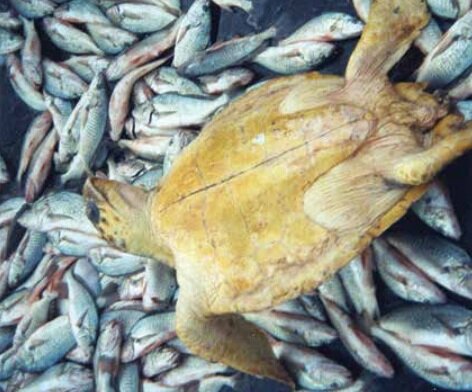Plant-Based Eating Saves the Oceans
/It is becoming more and more imperative that we take action to address many of the urgent problems in our world today. Of these many problems, saving the environment is of extreme importance to us today. Although these problems may seem overwhelming, simply eating a certain way can help solve many of these environmental problems. The focus of this blog post will be how plant-based eating saves our world’s oceans. Although this issue has been briefly touched upon in an earlier blog post linked here, it’s time to dive deeper into saving the Earth’s oceans.
Already, the Food and Agriculture Organization (FAO) of the United Nations reports that 80 percent of the world’s fish stocks are considered to be either fully exploited or overexploited. [1] Additionally, an article in the world-renowned peer-reviewed journal Science projects the global collapse of all species currently fished by the year 2048. [2] This great loss of biodiversity results mainly from the consequences of consuming seafood by humans.
For example, when fishing vessels go out on the sea to catch fish, they often injure animals such as dolphins, manatees, and whales, often with their propellers or other moving parts. Furthermore, bycatch—sea life not intended to be caught—also constitutes a large portion of the cause of ocean extinction. A paper published in the peer-reviewed journal Marine Policy found that about 100 million sharks are killed each year. [3] Just imagine how much we can do for our oceans by eating plant-based.
What’s even more concerning is that the ocean extinction caused by the consumption of seafood will also directly have consequences on terrestrial life as well. In fact, marine organisms, such as photosynthetic phytoplankton and algae, are responsible for more than half of our atmospheric oxygen, according to the National Oceanic and Atmospheric Administration. [4] If the biodiversity in the oceans plummets so will the oxygen levels throughout the world which will have disastrous effects. It’s also generally accepted that approximately 80 percent of the oxygen we breathe comes from the world’s oceans. [5]
Now that the situation at hand is clear, what can we do to help? Well, turns out one of the best actions to take is to go plant-based which clearly includes eliminating all seafood from one’s diet. Not only will eliminating seafood save the oceans, but removing all other animal products will too. Animal agriculture in general produces massive amounts of waste that pollutes streams, rivers and the oceans.
Furthermore, run-off such as pesticides, fertilizers, antibiotics, and nutrients from producing crops to feed the massive number of farmed animals pollutes the water as well—and can even lead to ocean dead zones. Shockingly, over a third of the global catch of wild fish is ground into fishmeal and fish oil to feed farmed animals—even including farmed fish. [5]
So, as you can see, one of the best ways to save our world’s oceans from aquatic life extinction and destruction is to go plant-based. If you are wondering how you can make this wonderful transition possible, then check out my blog post which details a few methods of doing just this.
Also, to help you get started with your journey, here’s a totally whole food plant-based recipe for oil-free No-Fry Fried Rice from the Recipes page of the website. Enjoy!
Sources:
[1] https://www.un.org/depts/los/convention_agreements/reviewconf/FishStocks_EN_A.pdf
[2] https://cdn.ioos.noaa.gov/media/2017/12/worm-et-al.pdf
[4] https://www.nytimes.com/2018/02/23/science/ocean-oxygen-production.html
[5] https://www.onegreenplanet.org/environment/why-you-should-go-vegan-for-the-oceans-this-earth-day/


